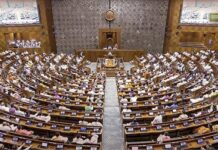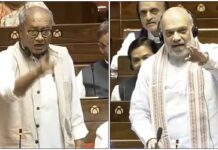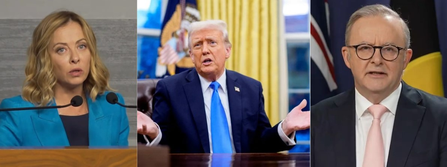Washington, April 3 (IANS) As US President Donald Trump signed an executive order on the so-called “reciprocal tariffs,” the world reacted sharply against the decision, with some calling it a “mistake that benefits no one” while others called it a violation of Washington’s obligations under the World Trade Organization (WTO).
Amid widespread opposition, Trump on Wednesday signed an executive order on the so-called “reciprocal tariffs,” imposing a 10-percent “minimum baseline tariff” and higher rates on certain trading partners, reports Xinhua news agency.
The Brazilian government criticised the US for imposing an additional 10 per cent tariff on all Brazilian exports, saying that the move violates Washington’s commitments to the World Trade Organization (WTO).
The US trade surplus with Brazil in 2024 amounted to approximately $7 billion in goods alone, and the surplus reached $28.6 billion last year when goods and services are combined, Brazil’s Foreign Ministry said in a statement, noting that “this represents the third-largest trade surplus for the United States worldwide.”
Given that the United States has recorded recurring and significant trade surpluses of 410 billion dollars in goods and services with Brazil over the past 15 years, the unilateral imposition of an additional 10 percent tariff on Brazil under the justification of restoring balance and ensuring “trade reciprocity” does not reflect reality, the ministry said.
“In defending Brazilian workers and businesses, and in line with its strong commitment to the multilateral trading system, the Brazilian government will consult with domestic industries to protect their interests and seek dialogue with the U.S. government,” it said.
While the government remains open to advancing the dialogue it has established in recent weeks with the United States, Brazil “is evaluating all possible courses of action to ensure reciprocity in bilateral trade, including resorting to the WTO, in defence of Brazil’s legitimate national interests,” it added.
Additionally, Brazil’s Congress also passed a bill that allows the government to impose reciprocal trade and environmental measures against foreign restrictions, just hours after Trump announced a new 10 per cent tariff on all Brazilian imports.
The bill, approved in the Chamber of Deputies a day after clearing the Senate, now awaits presidential ratification. It was fast-tracked through both houses with support from lawmakers across the political spectrum.
Initially drafted in response to unilateral environmental trade rules from the EU, the legislation was later broadened amid growing concern over escalating trade tensions with the United States.
The final version authorises the government to respond to any country or economic bloc that imposes trade or environmental measures deemed harmful to Brazilian exports or global competitiveness in agriculture and across industries.
Under the new law, Brazil’s Foreign Trade Chamber will be empowered to impose countermeasures, such as trade restrictions, suspension of concessions, or review obligations under-investment and intellectual property agreements.
However, automatic retaliation is off the table as the legislation requires a round of diplomatic consultations coordinated by the foreign ministry before any formal action is taken.
The shift signals a firmer posture from Brasilia in the face of mounting protectionist policies abroad, especially from the United States, which has moved to raise tariffs on key imports under the banner of “reciprocal trade.”
Italian Prime Minister Giorgia Meloni also on Wednesday night criticised Trump’s decision to impose tariffs on the EU, calling it “a mistake that benefits no one.”
She said that Italy would work to reach an agreement with the US to prevent a trade war that could weaken the West in favour of other global players.
“We will do everything we can to reach an agreement with the United States to avert a trade war, which would inevitably weaken the West and strengthen other global actors,” Meloni said.
“In any case, as always, we will act in the interests of Italy and its economy while also coordinating with our European partners,” she added.
If the tariffs were imposed, the EU would face a 20-percent tariff, according to Trump’s executive order.
Australian Prime Minister Anthony Albanese has also condemned the new US tariffs on imports from the nation as “unwarranted” and “not the act of a friend.”
Albanese on Thursday morning said that Trump’s announcement of a 10-per cent tariff on all imports from Australia did not come as a “surprise” to the government but said they have “no basis in logic.”
“The administration’s tariffs have no basis in logic, and they go against the basis of our two nations’ partnership,” Albanese told reporters in Melbourne.
He confirmed that Australia would not impose reciprocal tariffs on the United States, instead threatening to use “dispute resolution mechanisms” contained in the free trade agreement between the nations.
“The Australian people have every right to view this action by the Trump administration as undermining our free and fair trading relationship and counter to the shared values that have always been at the heart of our two nations’ longstanding friendship. This will have consequences for how Australians see this relationship,” he said.
The UK government and business groups also expressed concerns over Trump’s announcement of a 10 per cent tariff on all British imports, warning that the move could disrupt bilateral trade and put pressure on struggling sectors, including manufacturing and small businesses.
After Trump’s announcement, Business and Trade Secretary Jonathan Reynolds said the government would continue negotiations with the United States to seek a resolution. “We will always act in the best interests of UK businesses and consumers. Nobody wants a trade war,” he said.
“There are no winners in a trade war,” said Rain Newton-Smith, Chief Executive of the Confederation of British Industry, adding that Trump’s announcement is “deeply troubling for businesses and will have significant ramifications around the world.”
Scotland’s whisky producers also expressed disappointment, as the United States is the largest single export market for Scotch whisky. A spokesperson for the Scotch Whisky Association said the industry supported ongoing efforts by the British government to negotiate a deal, warning that higher tariffs could hurt sales and reduce competitiveness.
The Manufacturers Association of Israel (MAI) on Thursday voiced concern over Trump’s decision to impose a 17 per cent tariff on Israeli goods, calling it a “worrying step for Israeli exporters.”
Expressing surprise in a statement, the industry body said that 99 per cent of US goods entering Israel were already tariff-free before the policy shift. It warned that the new policy could harm Israel’s economic stability, deter foreign investment, and weaken Israeli companies’ competitiveness in the US market.
“This worrying step could harm jobs in Israel and reduce activity in the American market,” it added.
Canadian Prime Minister Mark Carney said that Canada will fight US tariffs with countermeasures.
“In a crisis, it’s important to come together and it’s essential to act with purpose and with force,” Carney said, adding that Canada’s strategic sectors, like pharmaceuticals, lumber and semiconductors, are facing the US potential threat.
Drew Dilkens, mayor of Windsor, the auto capital of Canada in the province of Ontario, said that with thousands and thousands of jobs at stake, he’s worried about how hard his city could be hit.
“It could be catastrophic,” said Dilkens in an interview with local media. “The economic fallout will stretch far beyond Windsor. It would ripple all the way through Ontario. It would ripple all the way through Michigan, Ohio, Indiana and Kentucky.”
Calling Trump “an arsonist,” Canada’s New Democratic Party leader Jagmeet Singh was quoted by local media as saying that the US president is “setting fire to the economy, his own economy, and ours as well.”
Ecuador’s main export industry group also warned that new US tariffs will significantly affect the country’s exports of agricultural goods, notably bananas, shrimp and cocoa.
The Trump administration’s plan to impose a 10 per cent tariff on imports from over 180 countries starting April 5 threatens Ecuador’s key exports, which currently enter the United States tariff-free, said the Ecuadorian Federation of Exporters (Fedexpor).
The group said the impact is compounded by Ecuador’s lack of a trade agreement with the United States, which is a gap that leaves Ecuador at a competitive disadvantage compared to regional exporters with preferential access.
“The absence of a trade deal with the US puts Ecuadorian exports in a weaker position under this new tariff regime,” it said in a statement.
Additionally, China opposed the US reciprocal tariffs and said that it would resolutely adopt countermeasures to safeguard its rights and interests.
–IANS
int/sd/




























